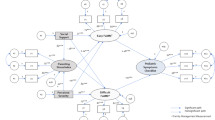Abstract
This study examined the relationship among cognitive functioning, social support networks, and risk for child abuse in a sample of 92 mothers of developmentally disabled children. Mothers found to be at highest risk for child abuse potential tended to score low on cognitive skills, social support networks, and life satisfaction. Beck Depression Inventory scores were found to explain 57% of the variance in the Child Abuse Potential Scores. Single mothers differed significantly from married mothers on child abuse potential, relationship satisfaction, community involvement, and loneliness. The authors discuss implications of the study and the need for future research with families of handicapped children.
Similar content being viewed by others
References
Anderson, S. C., and Lauderdale, M. L. (1982). Characteristics of abusive parents: A look at self-esteem.Child Abuse Neglect 6: 285–293.
Balkwell, C., and Halverson, C. F. (1980). The hyperactive child as a source of stress in the family: Consequences and suggestions for intervention.Family Relat. 9: 550–557.
Beck, A. T., and Beamesderfer, A. (1974). Assessment of depression: The Depression Inventory. In Pichot, P., and Olivier-Martin, R. (Eds.),Psychological Measurements in Psychopharmacology, J. Karger, Basel, Switzerland, pp. 151–169.
Beck, A. T., Ward, C. H., Mendelson, M., Mock, J., and Erbaugh, J. (1961). An inventory of measuring depression.Arch. Gen. Psychiat. 4: 561–571.
Bolton, F. G., Charlton, J. K., Gai, D. S., Laner, R. H., and Shumway, S. M. (1985). Preventive screening of adolescent mothers and infants: Critical variables in assessing risk for child maltreatment,J. Primary Prev. 5: 169–187.
Breslau, N. (1983a). Family care: Effects on siblings and mothers. In Thompson, G. H., Rubin, I. L., and Bilenker, R. M. (Eds.),Comprehensive Management of Cerebral Palsy, Grune & Stratton, New York, pp. 299–309.
Breslau, N. (1983b). Care of disabled children and women's time use.Med. Care 21: 620–629.
Breslau, N., Staruch, K. S., and Mortimer, E. A., Jr. (1982). Psychological distress in mothers of disabled children.Am. J. Disabl. Child. 136: 682–686.
Cox, A., Rutter, M., Newman, S., and Bartak, L. (1975). A comparative study of infantile autism and specific developmental receptive language disorder: II. Parental characteristics.Brit. J. Psychiat. 126: 146–159.
Friedrich, W. N., Greenberg, M., and Crnic, K. A. (1983). A short form of the Questionnaire on Resources and Stress.Am. J. Ment. Def. 88: 41–48.
Greenberg, M. (1985).Scoring Manual for Inventory of Parent Experiences, Unpublished manuscript.
Heiby, E. B. (1983). Assessment of frequency of self-reinforcement.J. Personal. Social Psychol. 44: 1304–1307.
Kazak, A. E., and Wilcox, B. L. (1984). The structure and function of social support networks in families with handicapped children.Am. J. Commun. Psychol. 12: 645–661.
Lightfoot, S. L., and Oliver, J. M. (1985). The Beck inventory: Psychometric properties in university students.J. Personal. Assess. 49: 434–436.
Milner, J. S. (1986).The Child Abuse Potential Inventory: Manual, Psytec, Webster, N.C.
Olson, D. H., McCubbin, H. I., Barnes, H., Larsen, A., Muxen, M., and Wilson, M. (1982).Family Inventories (Available from Family Social Science, 290 McNeal Hall, University of Minnesota, St. Paul, Minn. 55108).
Robitaille, J., Jones, E., Gold, R. G., Robertson, K. R., and Milner, J. S. (1985). Child abuse potential and authoritarianism.J. Clin. Psychol. 41: 839–843.
Rose, E., and Hardman, M. L. (1981). The abused mentally retarded child.Ed. Train. Ment. Retard. 16: 114–118.
Roth, W. (1982). Poverty and the handicapped child.Child. Youth Serv. Rev. 4: 67–75.
Russell, D., Peplau, L. A., and Cutrona, C. E. (1980). The revised UCLA loneliness scale: Concurrent and discriminant validity evidence.J. Personal. Social Psychol. 39: 472–480.
Schilling, R. F., and Schinke, S. P. (1984a). Maltreatment and mental retardation. In Berg, J. M. (Ed.),Perspectives and Progress in Mental Retardation, Vol. I, University Park Press, Baltimore, pp. 11–22.
Schilling, R. F., and Schinke, S. P. (1984b). Personal coping and social support for parents of handicapped children.Child. Youth Serv. 6: 195–206.
Schilling, R. F., Schinke, S. P., Blythe, B. J., and Barth, R. P. (1981). Child maltreatment and mentally retarded parents: Is there a relationship?Ment. Retard. 20: 201–209.
Schilling, R. F., Schinke, S. P., and Kirkham, M. A. (1985). Coping with a handicapped child: Differences between mothers and fathers.Social Sci. Med. 21: 857–863.
Schilling, R. F., Kirkham, M. A., Snow, W. H., and Schinke, S. P. (1986). Single mothers of handicapped children: Different from their married counterparts?Fam. Relat. 35: 69–77.
Starr, R. H., Dietrich, K. N., Fischoff, J., Ceresnie, S., and Zweier, D. (1984). The contribution of handicapping conditions to child abuse.Top. Early Child. Special Ed. 4: 55–69.
Venters, M. (1981). Familial coping with chronic illness: The case of cystic fibrosis.Social Sci. Med. 15: 289–297.
Waisbren, S. E. (1980). Parents' reactions after the birth of a developmentally disabled child.Am. J. Ment. Def. 84: 345–351.
Author information
Authors and Affiliations
Rights and permissions
About this article
Cite this article
Kirkham, M.A., Schinke, S.P., Schilling, R.F. et al. Cognitive-behavioral skills, social supports, and child abuse potential among mothers of handicapped children. J Fam Viol 1, 235–245 (1986). https://doi.org/10.1007/BF00978562
Issue Date:
DOI: https://doi.org/10.1007/BF00978562



